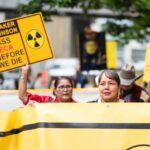Nuclear power in Ukraine: Crisis or path to energy independence?
By T. Kasperski | July 1, 2015
Ukraine is a major nuclear power, with 15 reactors that produce more than 13,000 megawatts of electricity annually. Nuclear power has become important in contemporary Ukraine as the country’s leaders seek energy independence from Russian oil and gas amid significant tensions between the two countries in the wake of Russia’s annexation of Crimea and as its proxy war in eastern Ukraine continues. Other challenges to Ukraine’s determination to expand nuclear energy production include the costly legacy of the Chernobyl disaster; bureaucratic changes that have blurred responsibilities for promotion and regulation of nuclear power; cost overruns typical for nuclear power everywhere; the aging of power stations; and uncertainty in how to deal with nuclear dependence on Russia in terms of both nuclear technologies and the nuclear fuel cycle. Yet Ukraine remains determined to produce the lion’s share of its electricity from nuclear power plants.
Together, we make the world safer.
The Bulletin elevates expert voices above the noise. But as an independent nonprofit organization, our operations depend on the support of readers like you. Help us continue to deliver quality journalism that holds leaders accountable. Your support of our work at any level is important. In return, we promise our coverage will be understandable, influential, vigilant, solution-oriented, and fair-minded. Together we can make a difference.
Issue: Bulletin of the Atomic Scientists Volume 71 Issue 4
Keywords: Chernobyl, Crimea, Russia, Ukraine, energy independence, nuclear energy, nuclear fuel cycle
Topics: Nuclear Energy















